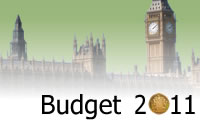 Go to main content
Go to main content
Archive Website of the UK government
Please note that this website has a UK government accesskeys system.
Main menu

Budget 2011 - the economy

The Chancellor’s Budget 2011 announced borrowing, inflation and growth figures for the UK economy as a whole over the past year and forecasts for the coming years. Forecasts were drawn up by the independent Office for Budget Responsibility (OBR). The Budget focused on three main themes – a strong and stable economy, growth and fairness – and measures designed to promote each.
Borrowing, inflation and growth figures
Borrowing
Public sector net borrowing was £146 billion this year. It will be:
- £122 billion next year
- £101 billion in 2012-13
- £70 billion in 2013-14
- £46 billion in 2014-15
- £29 billion in 2015-16
The UK’s national debt, as a share of national income, is forecast to be 60 per cent this year, before peaking at 71 per cent, and then starting to fall – reaching 69 per cent by the end of the period.
Inflation
The independent Office of Budget Responsibility expect inflation to remain between 4 and 5 per cent for most of this year, before dropping to 2.5 per cent next year and then to 2 per cent in two years time.
The Chancellor has written to the Governor of the Bank of England to confirm that the inflation target for the Monetary Policy Committee will remain at 2 per cent, as measured by the Consumer Prices Index.
Economic growth
The Chancellor estimated growth in the UK economy for the coming five years to be:
- 1.7 per cent in 2011
- 2.5 per cent in 2012
- 2.9 per cent in 2013
- 2.9 per cent in 2014
- 2.8 per cent in 2015
A strong and stable economy
The measures announced in the Budget will have a neutral effect on the public finances. The June Budget 2010 set out the plan to tackle the deficit in public finances. Budget 2011 announced further action that supports private sector-led growth while keeping to the deficit reduction plan.
The independent Office of Budget Responsibility’s judgement is that the government is on track to eliminate the structural current deficit and place debt on a downwards path by the end of the Parliament in 2015.
Growth
The government’s economic policy objective is to achieve strong, sustainable and balanced growth that is more evenly shared across the country and between industries. The Chancellor stated that this requires the economy to be rebalanced towards exports and private sector investment.
Budget measures designed to support private sector investment, enterprise and innovation include:
- a reduction in the main rate of corporation tax by two per cent.
- simplifying tax with the abolition of 43 tax reliefs
- increase the rate of R&D tax credits for small and medium-sized enterprises from 175 per cent to 225 per cent by April 2012
- 21 new Enterprise Zones, to focus growth in specific parts of the UK.
Corporation tax
From April 2011, the rate will be reduced to 26 per cent with further yearly reductions of one per cent until 2014 when it will reach 23 per cent
Enterprise zones
The first ten Enterprise Zones will be in Birmingham and Solihull, Leeds, Liverpool, Greater Manchester, the Tees Valley, Tyneside, the Bristol area, the Black Country, Derbyshire and Nottinghamshire, and Sheffield
Full details are in the government’s ‘Plan for Growth’.
Fairness
New measures meeting the government’s vision of a fair, simple and efficient tax, benefit and pensions system that rewards work and personal responsibility include:
- cutting fuel duty by one penny per litre from 6.00 pm on March 23
- increasing to the personal allowance for under 65s of £630 to £8,105 in April 2012
- funding for an additional 80,000 work experience placements for young people over the next two years and up to 50,000 additional apprenticeship places over the next four years
- helping homeowners and first-time buyers
- introducing a reduced rate of inheritance tax of 36 per cent from April 2012 for estates leaving 10 per cent or more to charity



 Facebook
Facebook Twitter
Twitter StumbleUpon
StumbleUpon Delicious
Delicious Reddit
Reddit